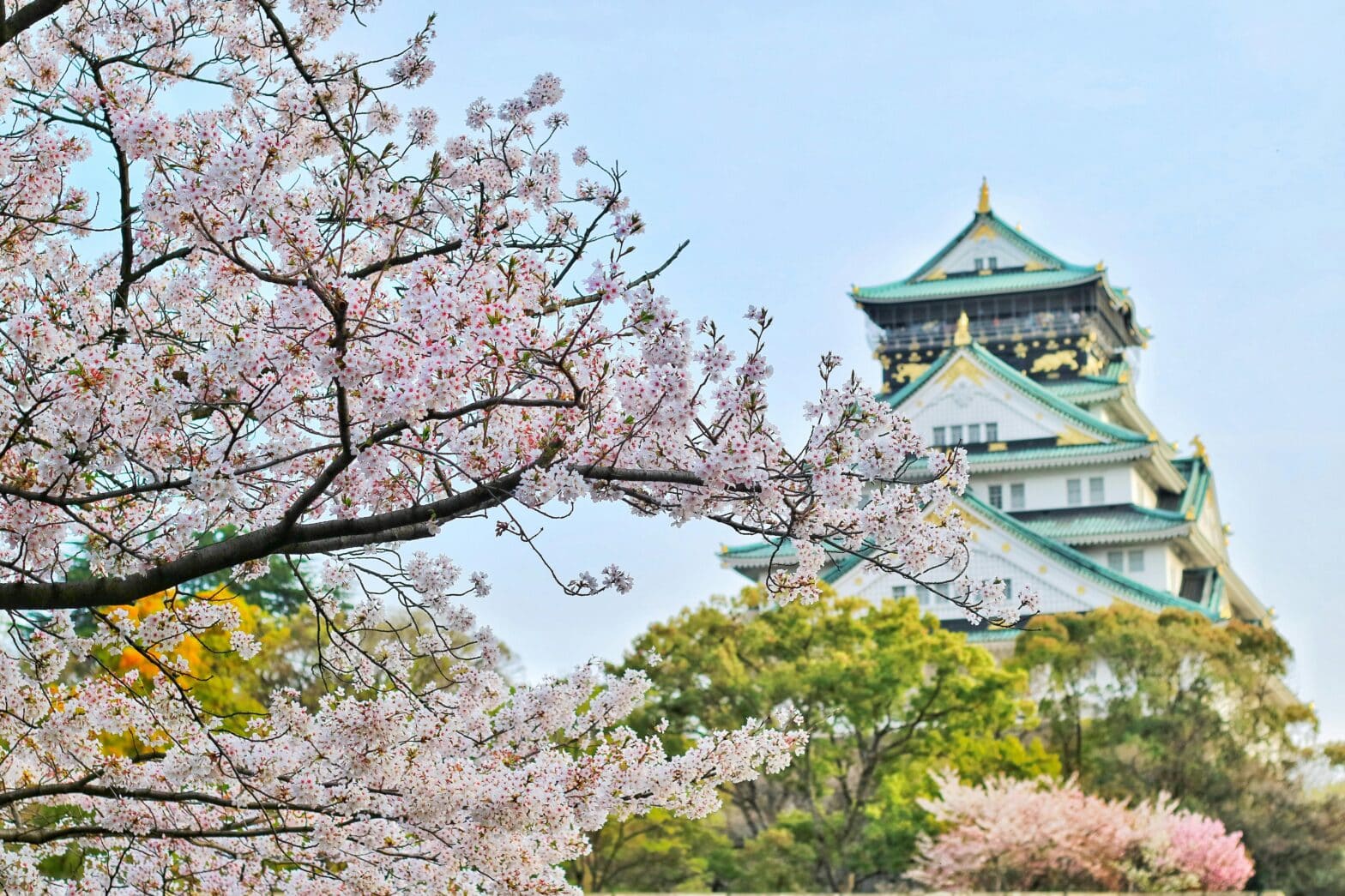Japan, with its iconic cherry blossom trees, skyscrapers, Japanese culture and gastronomy, continues to attract thousands of expatriates every year. If you are thinking of moving there, you are probably wondering what your monthly budget should be. Foyer Global Health answers this question with a comprehensive guide to all aspects of the cost of living in Japan.
Overview of the average cost of living in Japan
- The monthly cost of living for one person in Japan is 1,260 €.
- For a family of four, the monthly budget for living in Japan is 3,800 €.
These budgets include rent in Japan, as well as all the main expenditure items: shopping, energy charges, health, education, telecommunications services, leisure activities, etc. By way of comparison, the average cost of living in Japan is 25% lower than in Western Europe.
| Services | Average price in Japan |
|---|---|
| Average net monthly salary in Japan | €2,300 |
| Price of renting a city-centre flat | €560 to €1,200 |
| Purchase price of a city-centre flat per m2 | €6,000 /m2 |
| Petrol (1 L) | €1 |
| Mobile package (calls + 10 GB data) | €24 |
| Rice (1 kg) | €3.55 |
| Cappuccino in a café | €2.90 |
Currency and exchange rates in Japan
The official currency in Japan is the yen, abbreviated ‘JPY’ and symbolised ‘¥’.
Currently, 1 yen is equal to 0.0062 €, or 162 yen to 1 €. (Index as of 21 November 2024). It should be noted that the majority of transactions in Japan are carried out in cash, although an increasing number of establishments accept debit cards.
Accommodation in Japan
To find accommodation in Japan, here are the average prices to expect by property type:
- Studio in the city centre: JPY 90,450 (560 €)
- Studio apartment outside the city centre: JPY 60,000 (370 €)
- Three-bedroom flat in city centre: JPY 191,000 (1,200 €)
- Three-bedroom flat outside the city centre: JPY 115,100 (710 €)
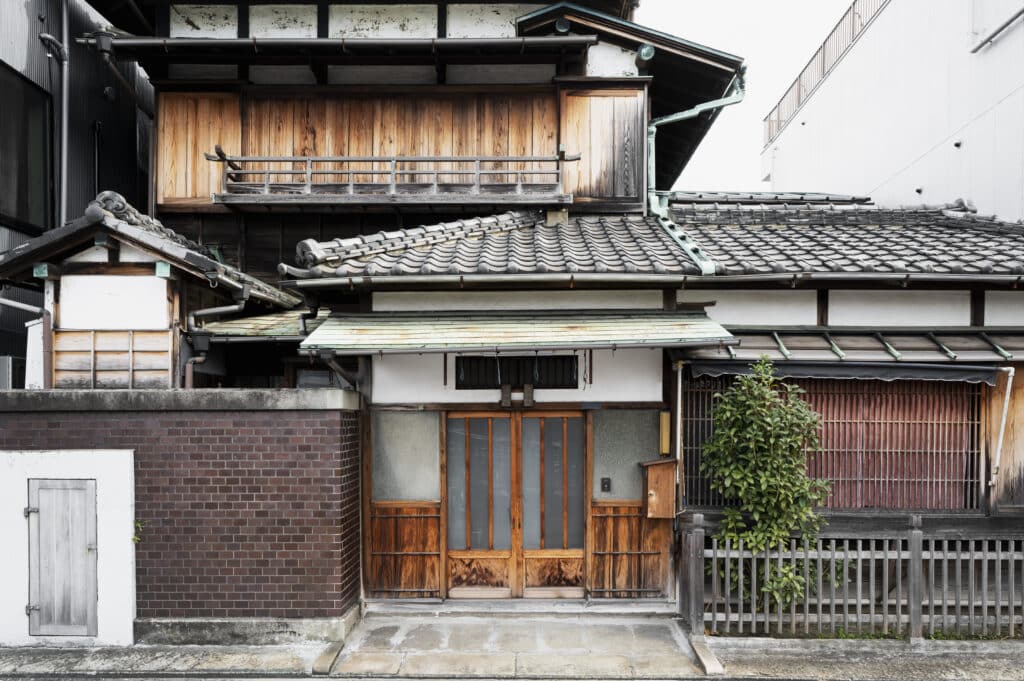
For expats wishing to become homeowners, expect to pay an average of JPY 572,000 (3,500 €) per m2 in the suburbs and JPY 980,000 (6,000 €) in the city centre.
Housing costs in Japan by city
Property prices in Japan vary enormously from one region to another. The monthly budget increases in the country’s megacities. Here is a comparison (in euros) of city-centre prices in Japan’s main cities:
| Property | Prices in Tokyo | Prices in Osaka | Prices in Yokohama |
|---|---|---|---|
| One-bedroom studio | €1,050 | €560 | €670 |
| Three-bedroom flat | €2,500 | €1,200 | €1,100 |
| Purchase price per m2 | €9,500 | €3,200 | €6,000 |
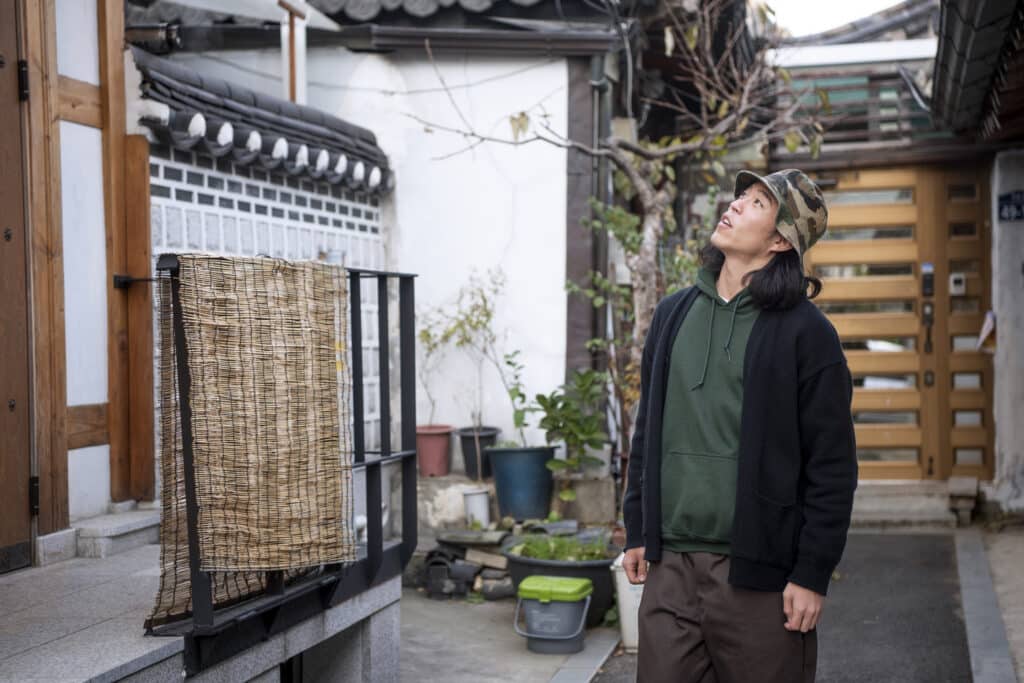
Grocery and restaurant budget for Japan
Food is the main item of expenditure in Japan. There are many local markets, and you can shop in both small shops, such as konbini open 24/7, and large supermarkets.
To give you an idea of how much you can expect to spend, here are the prices of groceries:
| Food item | Average price in Japan |
|---|---|
| Milk (1 L) | €1.40 |
| Water (1,5 L) | €0.70 |
| Bread (500 g) | €1.80 |
| Rice (1 kg) | €3.55 |
| Eggs (12 pieces) | €2 |
| Local cheese (1 kg) | €9 |
| Chicken fillets (1 kg) | €5.60 |
| Red meat (1 kg) | €13 |
| Apples (1 kg) | €4.80 |
| Bananas (1 kg) | €2.30 |
| Tomatoes (1 kg) | €4.40 |
| Potatoes (1 kg) | €2.70 |
| Onions (1 kg) | €3.40 |
| Local beer (500 ml) | €1.60 |
| Imported beer (330 ml) | 2 |
Meal prices in Japanese restaurants vary enormously from one establishment to another:
- Meal in a fast-food restaurant: 800 JPY (5 €).
- Bowl of ramen: 1,200 JPY (7 €).
- Lunch for two in a mid-range restaurant: 5,500 JPY (34 €).
- Bottle of soft drink in a bar: 160 JPY (1 €).
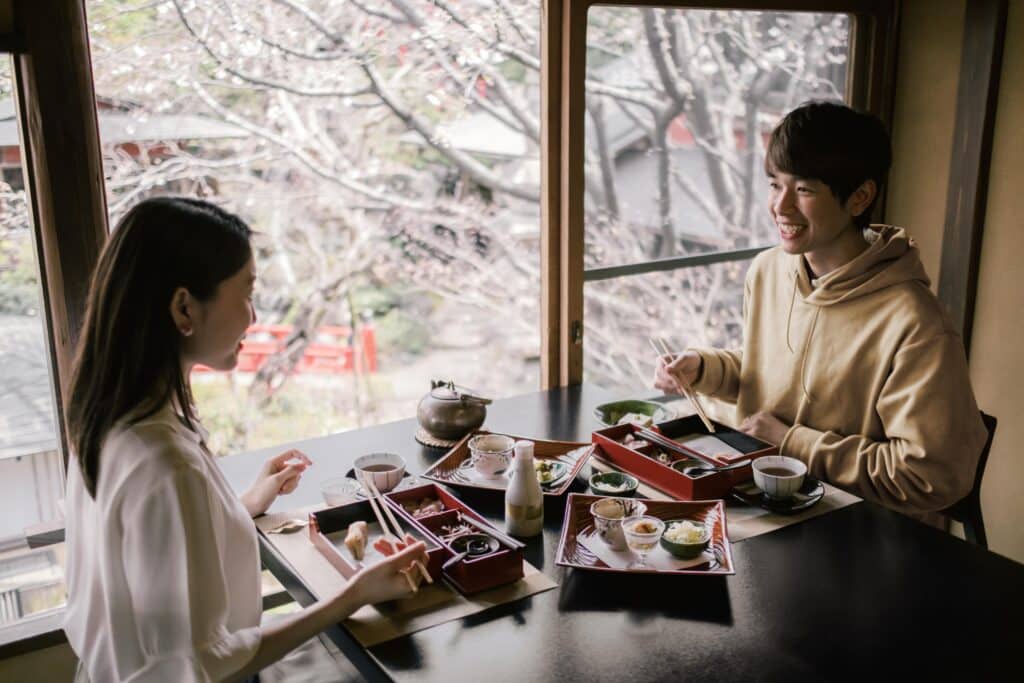
Transport
If you are thinking of moving to Japan, you should know that the country has an extensive public transport network. Most of the infrastructure is very modern and the means of transport varied. We find all sorts of fares:
- Metro: in Tokyo, the price of metro tickets differs according to the distance of the journey. You can expect to pay JPY 180, 210, 260, 300 or 330.
- Train: in general, train journeys cost JPY 20 per kilometre for short distances and JPY 10 per kilometre for long distances.
- Shinkansen: to travel by shinkansen, it is necessary to reserve a seat. Reservation fees vary between 320, 520 and 720 yen, plus fares depending on the distance travelled. On average, a journey costs between JPY 800 and JPY 11,000.
- Bus: buses are mainly used in the major cities. In Tokyo, a single ticket costs 210 JPY.
- Taxis: for a taxi journey, the starting price is around JPY 500, with an additional charge of JPY 600 per kilometre.
- Cars: drivers can fill up at JPY 170 (around 1 €) per litre of petrol.
Healthcare in Japan
According to the latest Numbeo 2024 Healthcare Index figures, Japan’s healthcare system is ranked third best in the world, behind Taiwan and South Korea. Here’s an overview of the prices of certain medical treatments in Japan:
| Medical services | Average price in Japan |
|---|---|
| Consultation with a general practitioner | 5,000 – 10,000 JPY (30 – 60 €) |
| Consultation with a specialist | 10,000 – 20,000 JPY (60 à 120 €) |
| Dental check-up with a dentist | 11,000 JPY (68 €) |
| Dental extraction | 27,700 JPY (170 €) |
| Childbirth in a private clinic | 355,000 – 615,500 JPY (2,200 à 3,800 €) |

Universal health insurance covers around 70% of healthcare costs. However, waiting times can be long, particularly for ophthalmology and dentistry.
To access high-quality medical services, many expatriates choose to take out private international health insurance. This option provides rapid access to care and full cover both in Japan and abroad, making it ideal for travelling with peace of mind.
Education
In Japan, the monthly cost of a private kindergarten is JPY 55,000 (340 €) per child. The annual cost of a primary school is around JPY 1,900,000 (11,700 €).
If you want to give your child a bilingual education, there are several international schools throughout the country, such as the One World International School in Osaka. Here are the annual school fees for the year 2024-2025:
- Early Childhood 2, 1, & Kindergarten (Ages 3–6) 410,000 JPY per term
- Primary Years Programme – Grades 1 to 5 (Ages 6–11) 490,000 JPY per term
Telecommunications services in Japan
Average prices for basic services are as follows:
- Mobile package (calls + 10 GB of data): JPY 2,000 to 6,800 (12.30 to 42 €)
- Internet subscription: JPY 4,000 to 7,000 (24.60 to 43.20 €)
Leisure activities in Japan
Life in Japan is punctuated by numerous leisure activities, whether in the countryside or in the lively districts of Tokyo. Here are the prices of some of the country’s most popular activities:
- Take part in the tea ceremony from the Tokyo Tower: JPY 3,300 (20 €) per person.
- Go to the Cat Mocha Café in Harajuku: JPY 350 (2.15 €) per drink and JPY 1,200 (7.40 €) per hour.
- Visit Osaka Castle: JPY 600 (3.70 €) per adult and free entry for children.
- Spend the day at the Kaiyukan Aquarium: JPY 2,900 (17.90 €) per adult and JPY 1,400 (8.65 €) per child.
- Climb Mount Fuji: 2,000 JPY (12.35 €) per person.
- Go to the cinema: JPY 1,900 (11.70 €) per ticket.
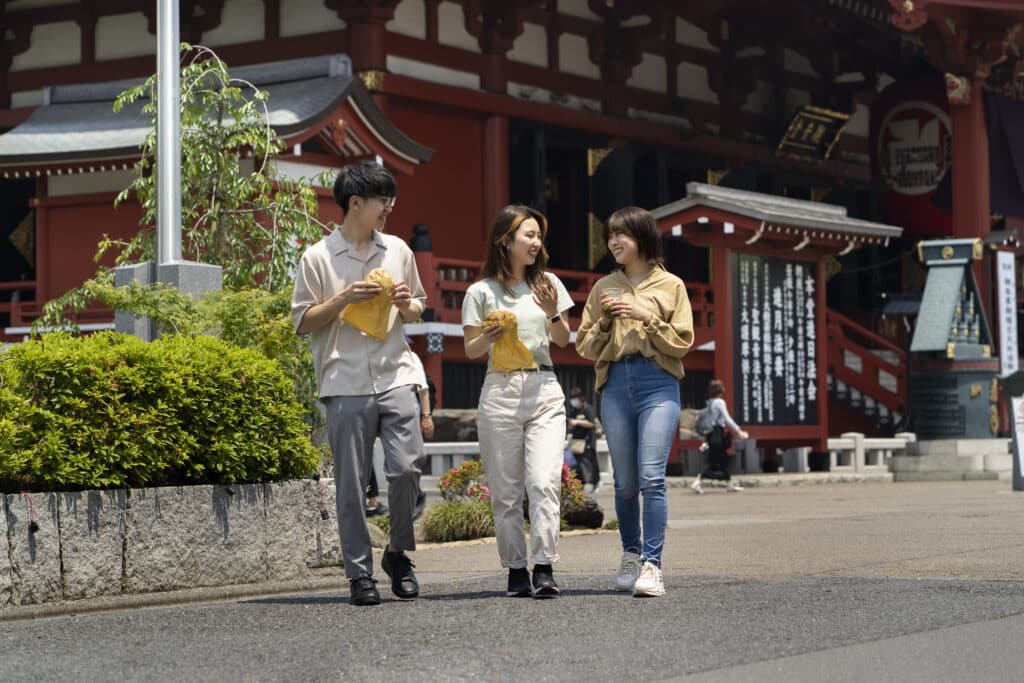
Cost of living in Japan compared with Western Europe
Living in Japan is on average 25% cheaper than in Western Europe. That said, this figure needs to be qualified, as the difference rapidly diminishes depending on your lifestyle. The country can quickly become more expensive than e.g. France if you live in Tokyo, particularly in popular areas.
The way you shop also plays a role: buying local products helps to keep costs down, whereas imported products can add to your budget. Leisure activities, which are often more expensive in Japan, also have an impact on the cost of living. For example, a gym membership costs an average of 65 € in Tokyo, compared with around 40 € in Paris.
For more details, here are a few comparisons:
Accommodation Japan – France:
- A studio flat in the city centre in France costs 780 €, compared with 560 € in Japan.
- The difference is less for buying, bearing in mind that the price per m2 in both France and Japan is around 3,500 € to 6,000 €.
Food prices:
Staple foods are generally more expensive in France, with the exception of fruit and vegetables.
| Food item | Price in Japan | Price in France |
|---|---|---|
| 12 eggs | €2 | €3.80 |
| Chicken (1 kg) | €5.60 | €12.60 |
| Meat (1 kg) | €13 | €18.80 |
| Apple | €4.80 | €2.80 |
| Banana | €2.30 | €2 |
| Tomato | €4.40 | €3.25 |
| Rice (1 kg) | €3.55 | €2.25 |
Transportation:
| Methos of transportation | Price in Japan | Price in France |
|---|---|---|
| Single ticket on local transport | €1.35 | €1.80 |
| Taxi (starting price) | €3.70 | €3 |
| Car (price per litre of petrol) | €1 | €1.80 |
Wages and purchasing power: Purchasing power in Japan is 9% higher than in France. However, the average salary in France is higher: 2,530 € compared with 2,300 €.
Cost of living in Japan compared with neighbouring countries:
South Korea
The cost of living in South Korea, including rent, is more than 20% higher than in Japan.
Almost all items of expenditure are higher, except for transport, which is often more expensive in Japan.
Taiwan
To live in Taiwan, a single person needs an average monthly budget of 1,100 €, whereas in Japan this budget is 1,260 €. This means that the cost of living in Taiwan is slightly lower than in Japan.
However, the average salary in Japan is around €600 higher, and purchasing power is 15% higher.
China
The average cost of living in China is 40% lower than in Japan.
However, this difference is reduced to around 15% when the two countries’ capital cities, Tokyo and Beijing, are compared.
The average salary in Japan is also higher, at 2,300 € compared with 900 € in China.
